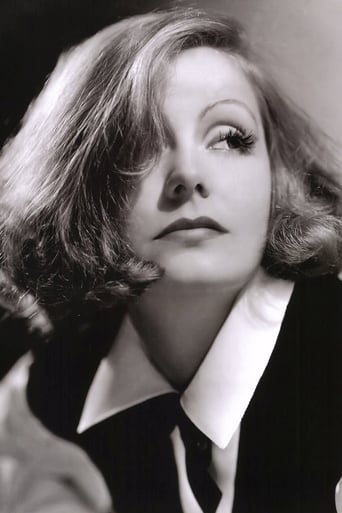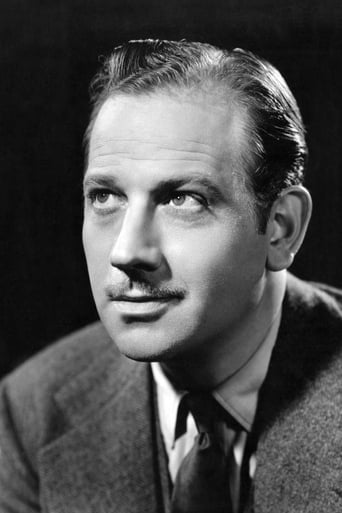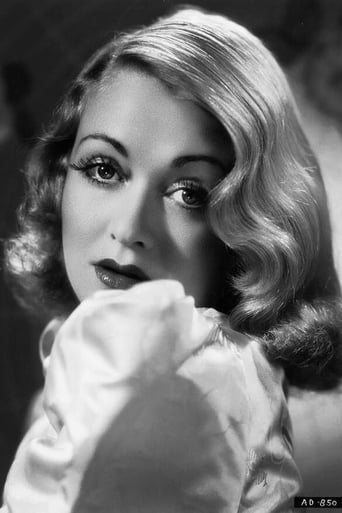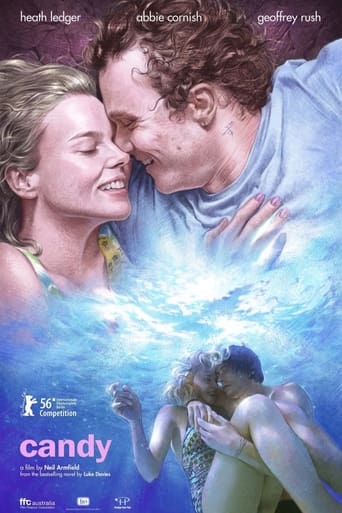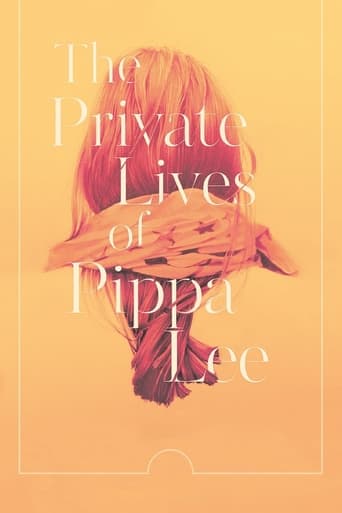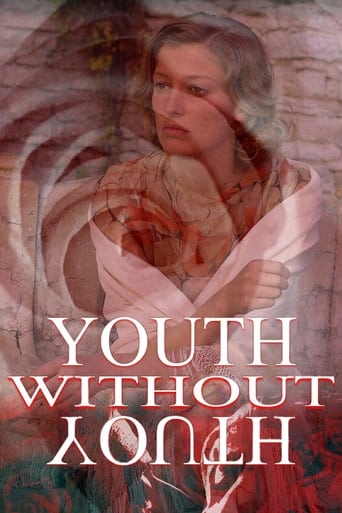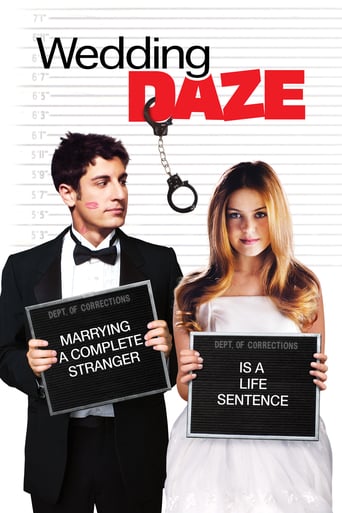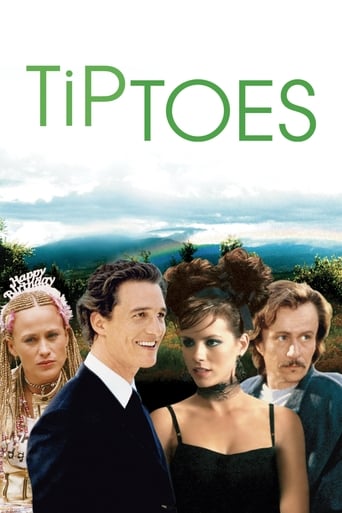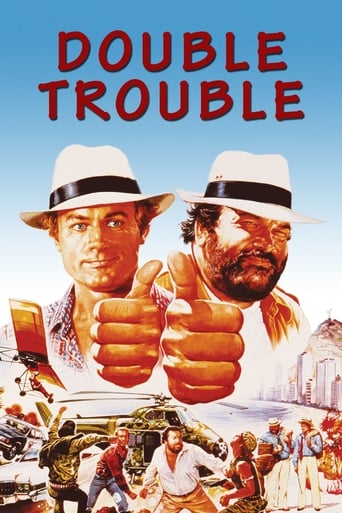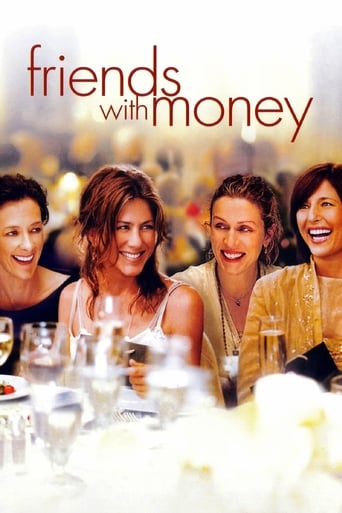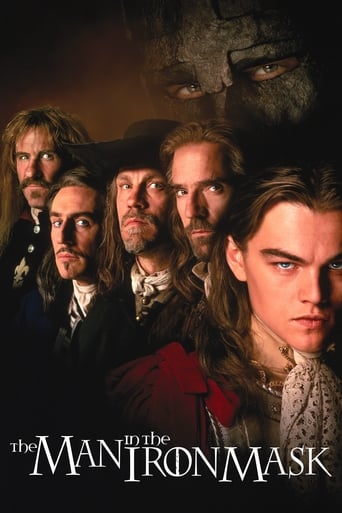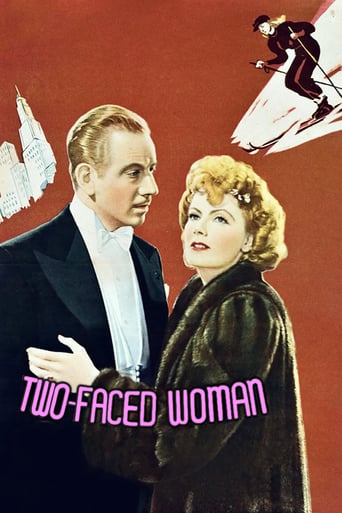
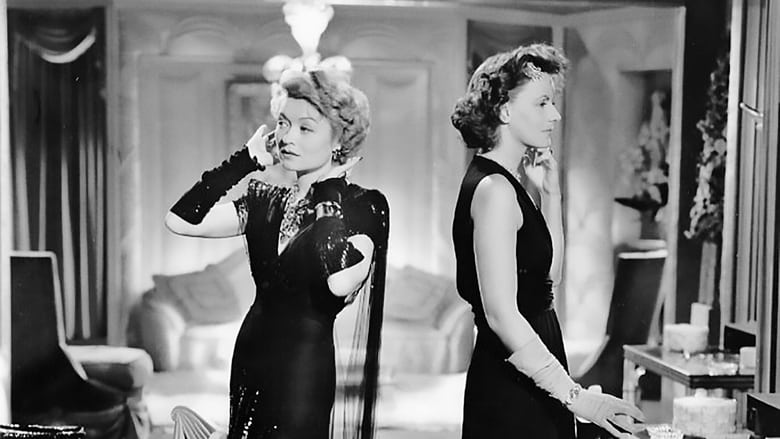
Two-Faced Woman (1941)
A woman pretends to be her own twin sister to win back her straying husband.
Watch Trailer
Cast


Similar titles
Reviews
Fresh and Exciting
It’s not bad or unwatchable but despite the amplitude of the spectacle, the end result is underwhelming.
It's funny, it's tense, it features two great performances from two actors and the director expertly creates a web of odd tension where you actually don't know what is happening for the majority of the run time.
The best films of this genre always show a path and provide a takeaway for being a better person.
TWO-FACED WOMAN (Metro-Goldwyn-Mayer, 1941), directed by George Cukor, stars Greta Garbo in her second American comedy that was to become her final motion picture screen appearance. Working opposite again with Melvyn Douglas, her co-star in the now classic comedy, NINOTCHKA (1939), TWO FACED WOMAN, by comparison, is often labeled a disappointment. Disappointment as it may be, it's still a watchable item due to it being the only opportunity to see the dramatic Garbo skiing, swimming, laughing, cigarette smoking, getting tipsy with champagne, and having the time of her life doing a Rumba type dance, "La Chica Chaca." Aside from her forties hairstyle, Garbo also wears an assembly of costumes designed by Adrian. What movie can there be Garbo playing one woman with two different personalities rather than two faces? That's TWO-FACED WOMAN.The plot opens at an Idaho Snow Lodge ("Ski your way to health') where Larry Blake (Melvyn Douglas), an overworked New York magazine publisher, who, at the advise of his doctor, comes for a rest. Almost immediately, he becomes attracted to Karin Borge (Greta Garbo), a ski instructress. Though she shows no interest in having Blake as her only pupil, his mishaps on both ski lift and mountain slopes are enough to have them married before the night is over. Their honeymoon is cut short with the arrival of Larry's executive partner, O.O. Miller (Roland Young), and his secretary, Ruth Ellis (Ruth Gordon), who come to take Larry back with them to New York the next morning to assist them with magazine matters. Because of this, an argument occurs, forcing Larry to leave without Karin, with intentions of returning to her once the assignment is completed. Though they continue to correspond by telegram, Larry's theatrical engagement with former flame and playwright, Griselda Vaughn (Constance Bennett) postpones his return for several more months. Through the arrangements with Miss Ellis, Karin secretly arrives in New York and surprise Larry. She's soon met with a surprise when finding Larry with Griselda at the 43rd Street Theater during rehearsals of her production, "Nostalgia in Chromium," to be more than just business partners. Attempting to flee the theater without being seen, she's then spotted by O.O.Miller but "introduced" to him by Miss Ellis as Mrs. Blake's twin sister, Kathryn. As the fictitious carefree twin sister, Karin assumes her masquerade by putting her husband to the test.Reportedly a modern reworking to an old silent comedy, HER SISTER FROM Paris (First National, 1925) starring Constance Talmadge and Ronald Colman, this latest edition proved nothing new to audiences of 1941, with the exception of Garbo assuming the sort of role expected by possibly Irene Dunne, Carole Lombard or Katharine Hepburn to enact. While this was intended to be a welcome change for Garbo fans, it proved otherwise. Interestingly, this premise of deceit had already been done earlier, to a better degree, under Preston Sturges' amiable direction of THE LADY EVE (Paramount, 1941) starring Barbara Stanwyck playing look-alike characters to confuse and win back the man she loves (Henry Fonda). With the exception of the ski sloping finale that mirrors that of Abbott and Costello's 1943 comedy, HIT THE ICE (Universal), and Constance Bennett's hilarious shrieking bits, TWO-FACED WOMAN offers little cleverness and witty one-liners that had THE LADY EVE work out so well. Having the serious-minded Karin marry a complete stranger hours after their initial meeting seems out of character for Garbo. Script revision depicting her and Larry as a divorced couple remarrying and giving their marriage another try might have been better suited. The Douglas character is more on a two-faced level here, showing great interest in his new bride one moment and growing tired of her the next. He's first romantic, then domineering and critical the next, the latter that doesn't go well with any independent woman. Miss Ellis sums it up well by saying, "They're in love!" Without these marital mishaps, there could never be any situations leading to Karin's fictional gold-digging, man-chasing twin sister to liven things up. Though portions of this comedy misses the mark, it does have Garbo leaving the motion picture screen not in traditional tears, but with good humorous fun. Also look for the young Robert Sterling in this production.Distributed to home video in the 1990s, TWO-FACED WOMAN often plays on Turner Classic Movies, home of the MGM film library, and those starring the legendary Greta Garbo. La Chica Chaca. (***)
Good writers, sparkling cast, Cukor direction, all the luxe trappings of MGM, but this attempted soufflé of a comedy is unworthy of Garbo, and probably helped speed her exit from Hollywood. Metro tries to domesticate her, to make her more of a Jean Arthur-Claudette Colbert sort of spunky dame, and she's certainly capable, but we know she's capable of so much more. Some post-production tampering on behalf of the Production Code renders the story meaningless--if Douglas knows of Garbo's deception, why doesn't he just confront her with it and end the movie?--and their relationship is an unconvincing yes-you-love-me-no-you-don't mishmash. Too, Douglas's character, though meant to represent appealing American manhood circa 1941, is rather a rotter--deceptive, callous, impatient, faithless--and while Douglas surely has the requisite charm, he doesn't make me like this guy. Constance Bennett provides some glamor and dry wit, and Ruth Gordon and Roland Young, stuck in conventional supporting roles, kill time amiably. But the novelty appeal of seeing Garbo in a swimsuit, Garbo dancing the Chica- Choca, Garbo playing a sort-of double role, isn't enough to save the picture.
I don't usually make a review after only watching one scene in a movie, but when I watched the dancing scene in you tube I was truly moved and I decided to do it anyway..."Two-Faced Woman" is mostly known for being Garbo's last film and for the bad reviews the stunning actress and the film itself received. However, the scene I just watched, the improvised dance, is that good that made me wanna watch the whole film.Garbo certainly had as much as talent for comedy roles, as much as for dramatic ones. And she really sparkles in this one.I believe the critics of the time were too harsh and too much in a hurry to bury the film, that made the audience turn away from it. I never saw Mrs Garbo that happy, beautiful and feminine in all her films put together. She really proved that she could play a happy-go-lucky woman as easily as she could portrait an ice-cold dynamic Queen or a doomed damsel...I don't remember if The Acedemy honored her with an honorary Oscar, but it they didn't shame on them...
***SPOILERS*** Despite its somewhat lackluster reviews from the critics "Two Faced Woman" comes across as one of the best screwball comedies to come out of Hollywood in the 1930's and 1940's.Greta Garbo in a duel role as both Karin & Kathreen Borg is a ski instructor at the "Snow Lodge" in Idaho who meets and falls in love, after he fell and almost broke his head, with New York magazine editor of "Tides & Currents" Larry Blake, Melvyn Douglas. Larry sick and tired of the dog eat dog existence as a magazine editor back in New York whats to turn over a new leaf in not only marrying the outdoors type Karin but leave the publishing and magazine business altogether and live in the great outdoors of far away Idaho; Where the air is fresh and clean and the potatoes, when baked, tastes delicious.It's when Larry travels back to New York to clear up some very pressing business matters before he calls it quits that Karin, back in Idaho, decides to check up on her husband by secretly traveling to the "Big Apple" herself. The trip almost turns into a disaster when Karin is spotted by Larry's partner and friend in the publishing business Oscar O.O. Miller, Roland Young, but with the help of his secretary Ruth Ellis, Ruth Gordon, gets herself a complete makeover and is transformed into Kathleen Borg! Karin's partying smoking drinking and dancing, the total opposite of Karin, twin sister!Greta Garbo really lets her hair down in this movie as both Karin & Kathleen Borg driving her confused husband Larry bananas in him not quite being able to make out if Kathleen is really his wife Karin or or twin sister. It's later in the film that Larry gets the news,by phone, back in Idaho that Karin had left for New York that he manages to put two and two together and realizes that his wife is playing a dirty trick on him and decides to double-cross her in return! By having a hot and heavy affair with Karin's "twin sister" Kathleen behind her back!The film "Two Face Woman" had trouble at first being released due to pressure by the "Catholic League of Decency" in the fact that Larry while married to Karin was romantically involved with another woman Kathleen even though he didn't know that the two were one and the same person! This all was corrected by inserting into the movie a scene,the phone call to Idaho, where Larry did in fact find out about Karin's masquerade before he started to make his move, by getting her in the shack with him, on her! With WWII in full swing when the film was made Greta Garbo decided to wait until the the hostilities were over to continue her film career. As things turned out Garbo found that the peace and quite life as a private citizen, with millions in the bank, was far better then the pressures of being a top Hollywood star in Tinseltown and retired from acting for good.


